Unit 3 Online tours Grammar: Simple past tense and present perfect tense 课件(24张PPT)
文档属性
| 名称 | Unit 3 Online tours Grammar: Simple past tense and present perfect tense 课件(24张PPT) | 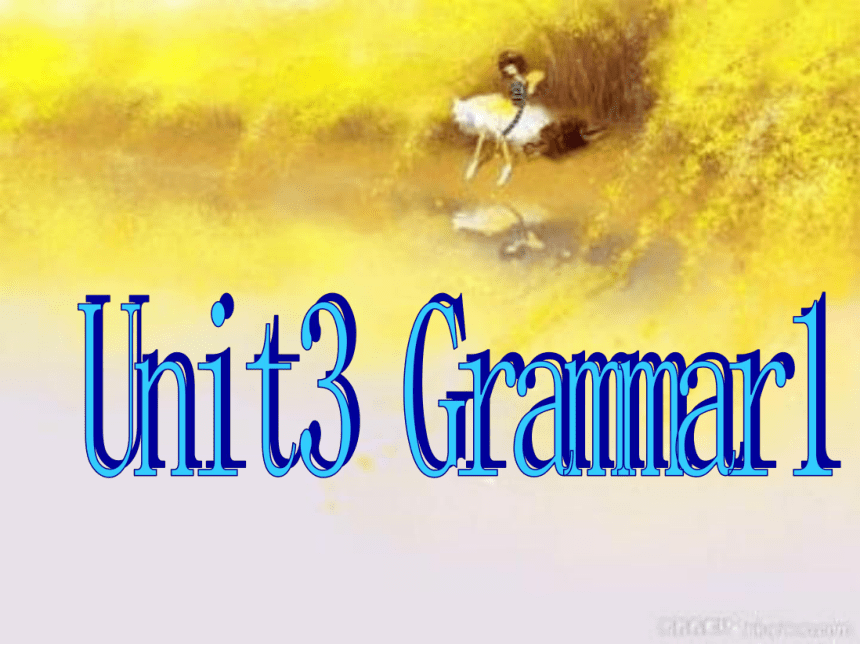 | |
| 格式 | ppt | ||
| 文件大小 | 469.5KB | ||
| 资源类型 | 教案 | ||
| 版本资源 | 牛津译林版 | ||
| 科目 | 英语 | ||
| 更新时间 | 2021-03-18 20:17:35 | ||
图片预览

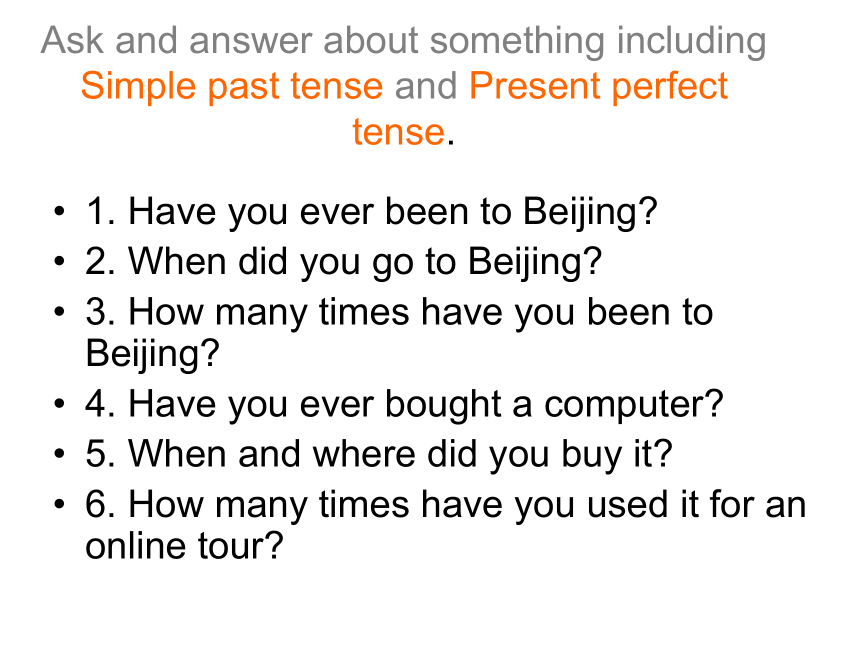
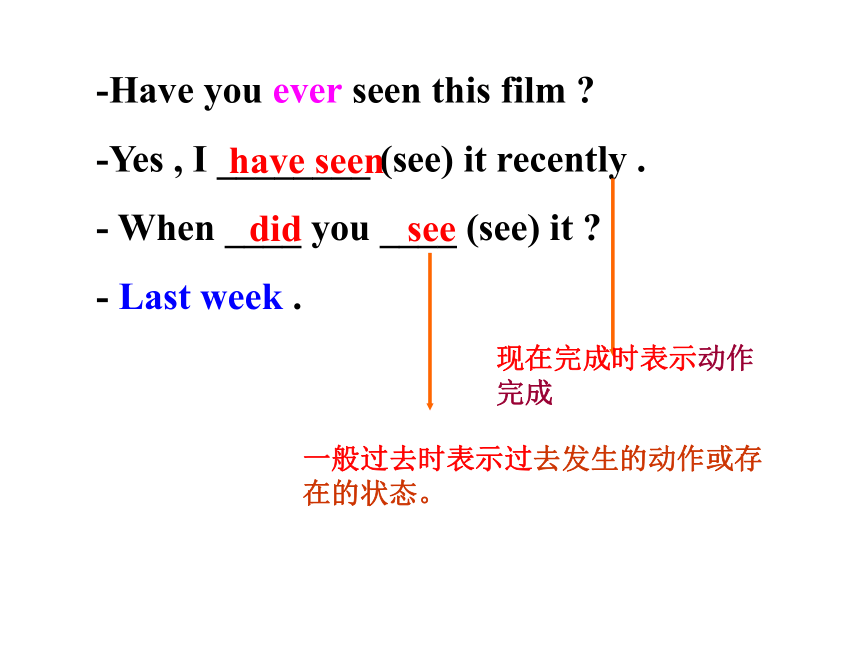
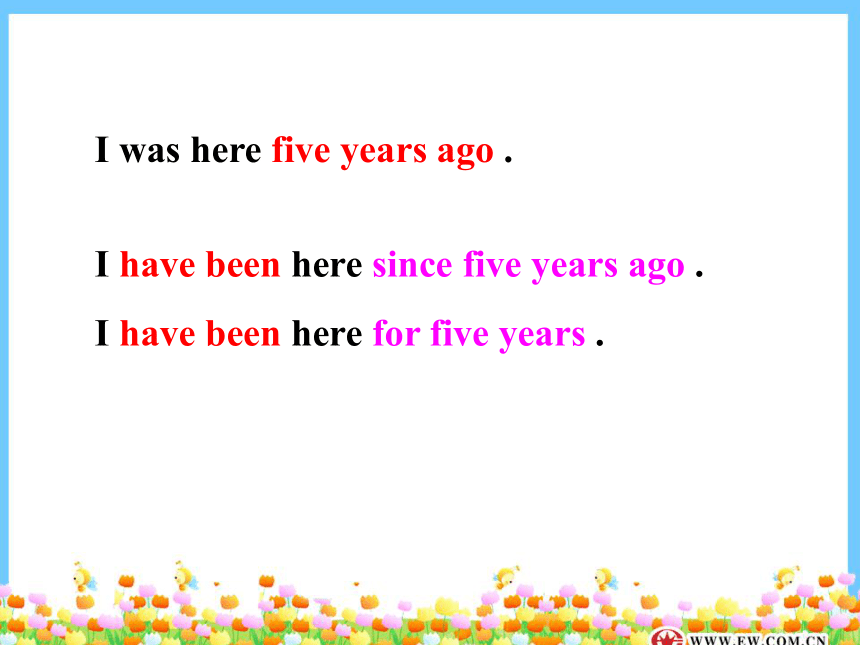
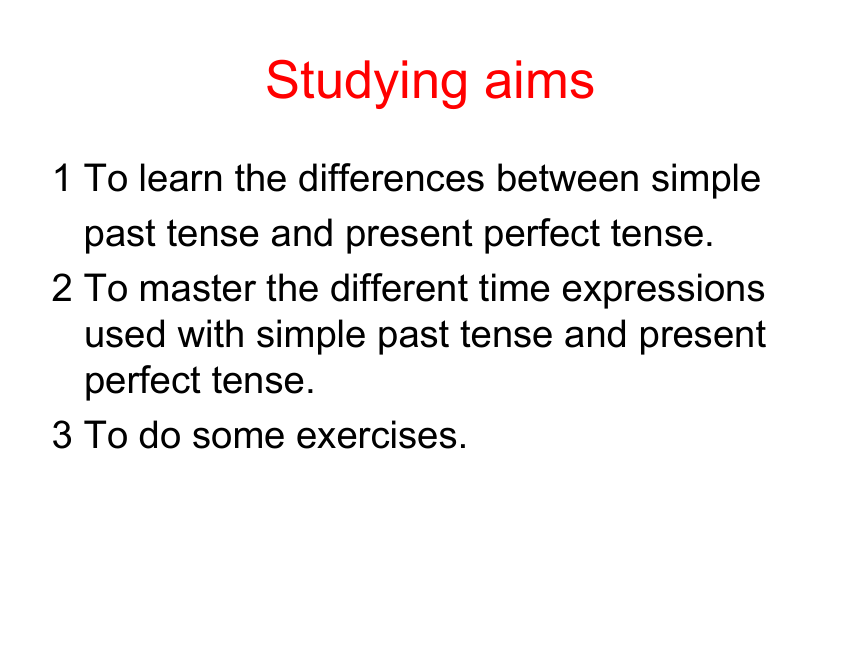
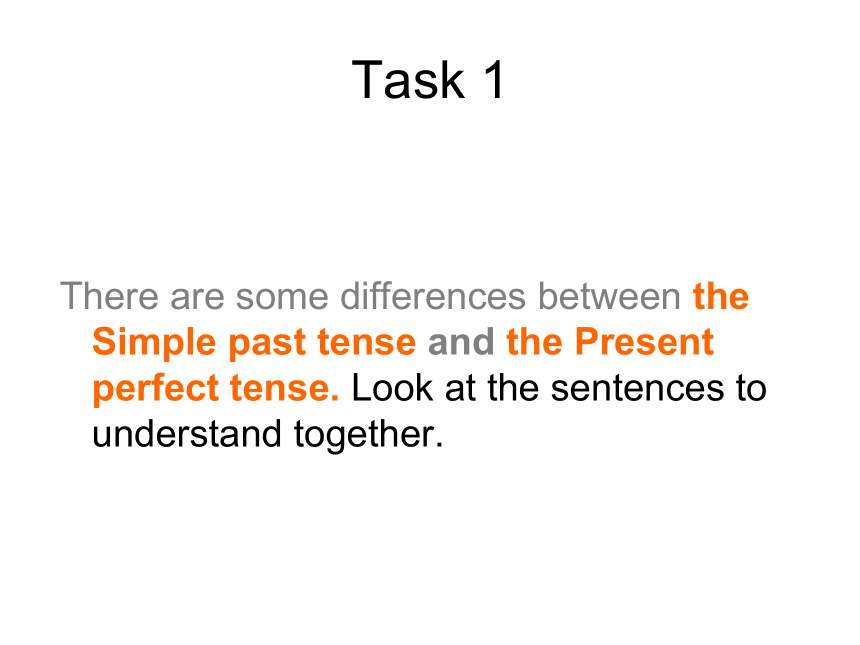
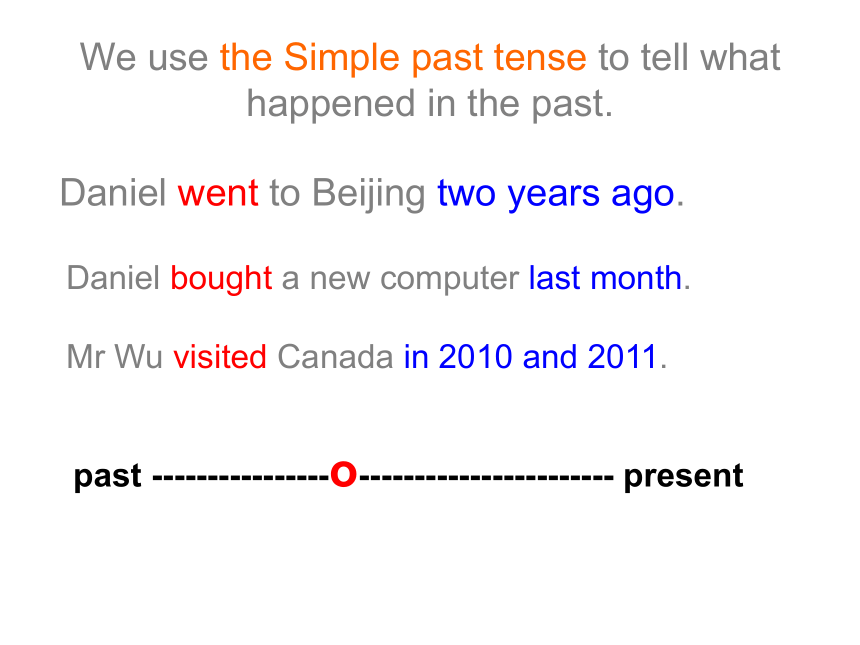
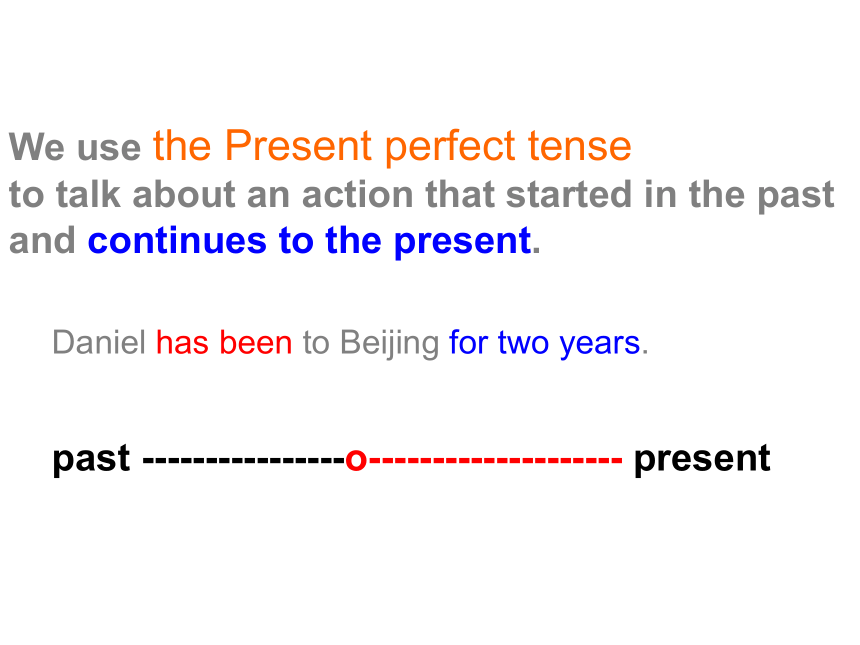
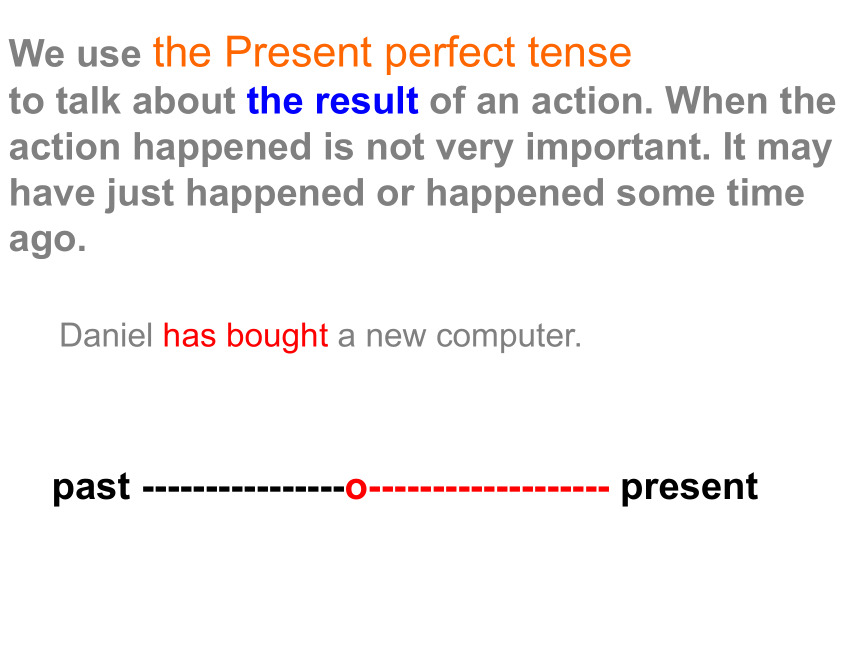
文档简介
Ask and answer about something including Simple past tense and Present perfect tense.
1. Have you ever been to Beijing?
2. When did you go to Beijing?
3. How many times have you been to Beijing?
4. Have you ever bought a computer?
5. When and where did you buy it?
6. How many times have you used it for an online tour?
-Have you ever seen this film ?
-Yes , I ________ (see) it recently .
- When ____ you ____ (see) it ?
- Last week .
have seen
did see
现在完成时表示动作完成
一般过去时表示过去发生的动作或存在的状态。
I was here five years ago .
I have been here since five years ago .
I have been here for five years .
Studying aims
1 To learn the differences between simple
past tense and present perfect tense.
2 To master the different time expressions used with simple past tense and present perfect tense.
3 To do some exercises.
Task 1
There are some differences between the Simple past tense and the Present perfect tense. Look at the sentences to understand together.
We use the Simple past tense to tell what happened in the past.
Daniel went to Beijing two years ago.
Daniel bought a new computer last month.
Mr Wu visited Canada in 2010 and 2011.
past ----------------o----------------------- present
We use the Present perfect tense
to talk about an action that started in the past and continues to the present.
Daniel has been to Beijing for two years.
past ----------------o-------------------- present
We use the Present perfect tense
to talk about the result of an action. When the action happened is not very important. It may have just happened or happened some time ago.
Daniel has bought a new computer.
past ----------------o------------------- present
Mr Wu has been to Canada twice.
We use the Present perfect tense
to tell how many times an action has happened till now.
past ----------------o------------------- present
Task 2
1 Read your books on Page134, find out the difference between the simple past tense and the present perfect tense.
2 Complete the blanks.
一般过去表示 ___________________________,
也表示过去经常或反复发生的动作。
e.g. He ______ (come) here yesterday.
2. 现在完成时表示 _______________
_____________________ 过去的动作(或者状态), 强调对现在产生的影响和结果。
e.g. He __________ (break) the glass.
在过去某个时间发生的动作或存在的状态
came
到说话时为止已经发生或完成
(不一定结束)的动作或状态
has broken
Differences:
构成不同
(1) Tom went to London last year.
(2) Lily has been to London twice.
一般过去时用 谓语动词用
动词的_________。
现在完成时用 谓语动词
用__________________
过去式
助动词 have/has +过去分词”
2. 用法不同
(1) I had supper an hour ago. 我一小时前吃的晚饭。
(表示过去的动作)
(2)I have just had supper.我刚刚吃过晚饭。
(强调对现在的影响——— 我不饿)
(3)He was a teacher then. 他那时是个教师。
(表示过去的状态)
(4)He has been a teacher since then.他从那时起一直当教师。 (他现在还是教师)
2. 用法不同
e.g. 1. We haven’t seem him since last year.
我们自从去年以来一直未见到他。
(现在还未见到)
2. We didn’t see him last year.
我们去年没见到他。(现在不一定未见到)
3. Who has open the door?
谁把门开了? (现在门还开着)
4. Who opened the door?
谁开的门? (指过去,和现在无关。)
( 现在不知道门开的还是关的)
3. 具体的时间状语
(1) 一般过去时的时间状语
Yesterday, once, last week, ….ago, in 1980, in October, just now 等。
(2)现在完成时的时间状语
for, since, so far, ever, never, just , yet, till, up to now,等。
Task 3
Complete the sentences with the correct forms of the words in brackets alone.
Work in groups to discuss and understand together.
Fill in the blanks:
Last Sunday, Ted and his father ______________ (be) at home. They ____________ (move) to a new house. His father _____________(want) to put the books in some boxes, but he _____________ (can not) find any boxes. Ted ____________ (tell) him the boxes _______________ (be) in the next room.
Then he ____________ (bring) these
boxes to his father.
were
moved
wanted
told
couldn’t
were
brought
1, Is Tom doing his homework?
No, he ______________ (finish) his homework.
2. Do you know Miss King?
No, but I ______________ (hear of) her before.
3. What about the film?
Sorry, I don’t know. I _______________ (not see) it yet.
4. _____________ you ever ____________ (be) to the Great Wall?
No, never.
5. Help yourself, please.
No, thanks. I am full.
I ____________ just __________ (eat) three
eggs.
has finished
have heard of
haven’t seen
Have
been
have
eaten
Task 4
1.Finish Part A and B on Page41.
2. Work in groups to discuss and understand together.
Part A
I _______ (visit) the Palace Museum with my grandparents the other day.
I ________ (climb) Mount Huang last Summer.
_______ you ever ________ (try) the famous Tianjin Baozi?
I am happy that I __________ (learn) to swim.
visited
climbed
Have tried
have learnt
Part B
1. I ____________ (finish/just) my homework.
Millie ________ (finish) her homework 20 minutes ago.
2. I _______ (write) an email to my friend yesterday.
Daniel ______________ (write/already) two emails.
3. I ______ (be) in Hainan last month.
Some of our classmates ____________ (not be) to Hainan yet.
4. I ____________ (live) in Sunshine Town since I was born.
Daniel ________ (live) in Nanjing in 2007.
have just finished
finished
wrote
has already written
was
have not been
have lived
lived
Fill in the blankets with the right verb forms:
--- you ever this book?
---Yes. I it two weeks ago. (read)
2. Last week we (visit) the museum.
3. He (work) here since 2010.
4. Kimi (have) a new computer now, he
(buy) it last year.
5. She (go) to America three times.
6. Tom (live) in that small town in 2000, and he just (move) to the new city.
当堂检测
Practice making sentences with the two difference tenses.
1. Have you ever been to Beijing?
2. When did you go to Beijing?
3. How many times have you been to Beijing?
4. Have you ever bought a computer?
5. When and where did you buy it?
6. How many times have you used it for an online tour?
-Have you ever seen this film ?
-Yes , I ________ (see) it recently .
- When ____ you ____ (see) it ?
- Last week .
have seen
did see
现在完成时表示动作完成
一般过去时表示过去发生的动作或存在的状态。
I was here five years ago .
I have been here since five years ago .
I have been here for five years .
Studying aims
1 To learn the differences between simple
past tense and present perfect tense.
2 To master the different time expressions used with simple past tense and present perfect tense.
3 To do some exercises.
Task 1
There are some differences between the Simple past tense and the Present perfect tense. Look at the sentences to understand together.
We use the Simple past tense to tell what happened in the past.
Daniel went to Beijing two years ago.
Daniel bought a new computer last month.
Mr Wu visited Canada in 2010 and 2011.
past ----------------o----------------------- present
We use the Present perfect tense
to talk about an action that started in the past and continues to the present.
Daniel has been to Beijing for two years.
past ----------------o-------------------- present
We use the Present perfect tense
to talk about the result of an action. When the action happened is not very important. It may have just happened or happened some time ago.
Daniel has bought a new computer.
past ----------------o------------------- present
Mr Wu has been to Canada twice.
We use the Present perfect tense
to tell how many times an action has happened till now.
past ----------------o------------------- present
Task 2
1 Read your books on Page134, find out the difference between the simple past tense and the present perfect tense.
2 Complete the blanks.
一般过去表示 ___________________________,
也表示过去经常或反复发生的动作。
e.g. He ______ (come) here yesterday.
2. 现在完成时表示 _______________
_____________________ 过去的动作(或者状态), 强调对现在产生的影响和结果。
e.g. He __________ (break) the glass.
在过去某个时间发生的动作或存在的状态
came
到说话时为止已经发生或完成
(不一定结束)的动作或状态
has broken
Differences:
构成不同
(1) Tom went to London last year.
(2) Lily has been to London twice.
一般过去时用 谓语动词用
动词的_________。
现在完成时用 谓语动词
用__________________
过去式
助动词 have/has +过去分词”
2. 用法不同
(1) I had supper an hour ago. 我一小时前吃的晚饭。
(表示过去的动作)
(2)I have just had supper.我刚刚吃过晚饭。
(强调对现在的影响——— 我不饿)
(3)He was a teacher then. 他那时是个教师。
(表示过去的状态)
(4)He has been a teacher since then.他从那时起一直当教师。 (他现在还是教师)
2. 用法不同
e.g. 1. We haven’t seem him since last year.
我们自从去年以来一直未见到他。
(现在还未见到)
2. We didn’t see him last year.
我们去年没见到他。(现在不一定未见到)
3. Who has open the door?
谁把门开了? (现在门还开着)
4. Who opened the door?
谁开的门? (指过去,和现在无关。)
( 现在不知道门开的还是关的)
3. 具体的时间状语
(1) 一般过去时的时间状语
Yesterday, once, last week, ….ago, in 1980, in October, just now 等。
(2)现在完成时的时间状语
for, since, so far, ever, never, just , yet, till, up to now,等。
Task 3
Complete the sentences with the correct forms of the words in brackets alone.
Work in groups to discuss and understand together.
Fill in the blanks:
Last Sunday, Ted and his father ______________ (be) at home. They ____________ (move) to a new house. His father _____________(want) to put the books in some boxes, but he _____________ (can not) find any boxes. Ted ____________ (tell) him the boxes _______________ (be) in the next room.
Then he ____________ (bring) these
boxes to his father.
were
moved
wanted
told
couldn’t
were
brought
1, Is Tom doing his homework?
No, he ______________ (finish) his homework.
2. Do you know Miss King?
No, but I ______________ (hear of) her before.
3. What about the film?
Sorry, I don’t know. I _______________ (not see) it yet.
4. _____________ you ever ____________ (be) to the Great Wall?
No, never.
5. Help yourself, please.
No, thanks. I am full.
I ____________ just __________ (eat) three
eggs.
has finished
have heard of
haven’t seen
Have
been
have
eaten
Task 4
1.Finish Part A and B on Page41.
2. Work in groups to discuss and understand together.
Part A
I _______ (visit) the Palace Museum with my grandparents the other day.
I ________ (climb) Mount Huang last Summer.
_______ you ever ________ (try) the famous Tianjin Baozi?
I am happy that I __________ (learn) to swim.
visited
climbed
Have tried
have learnt
Part B
1. I ____________ (finish/just) my homework.
Millie ________ (finish) her homework 20 minutes ago.
2. I _______ (write) an email to my friend yesterday.
Daniel ______________ (write/already) two emails.
3. I ______ (be) in Hainan last month.
Some of our classmates ____________ (not be) to Hainan yet.
4. I ____________ (live) in Sunshine Town since I was born.
Daniel ________ (live) in Nanjing in 2007.
have just finished
finished
wrote
has already written
was
have not been
have lived
lived
Fill in the blankets with the right verb forms:
--- you ever this book?
---Yes. I it two weeks ago. (read)
2. Last week we (visit) the museum.
3. He (work) here since 2010.
4. Kimi (have) a new computer now, he
(buy) it last year.
5. She (go) to America three times.
6. Tom (live) in that small town in 2000, and he just (move) to the new city.
当堂检测
Practice making sentences with the two difference tenses.
